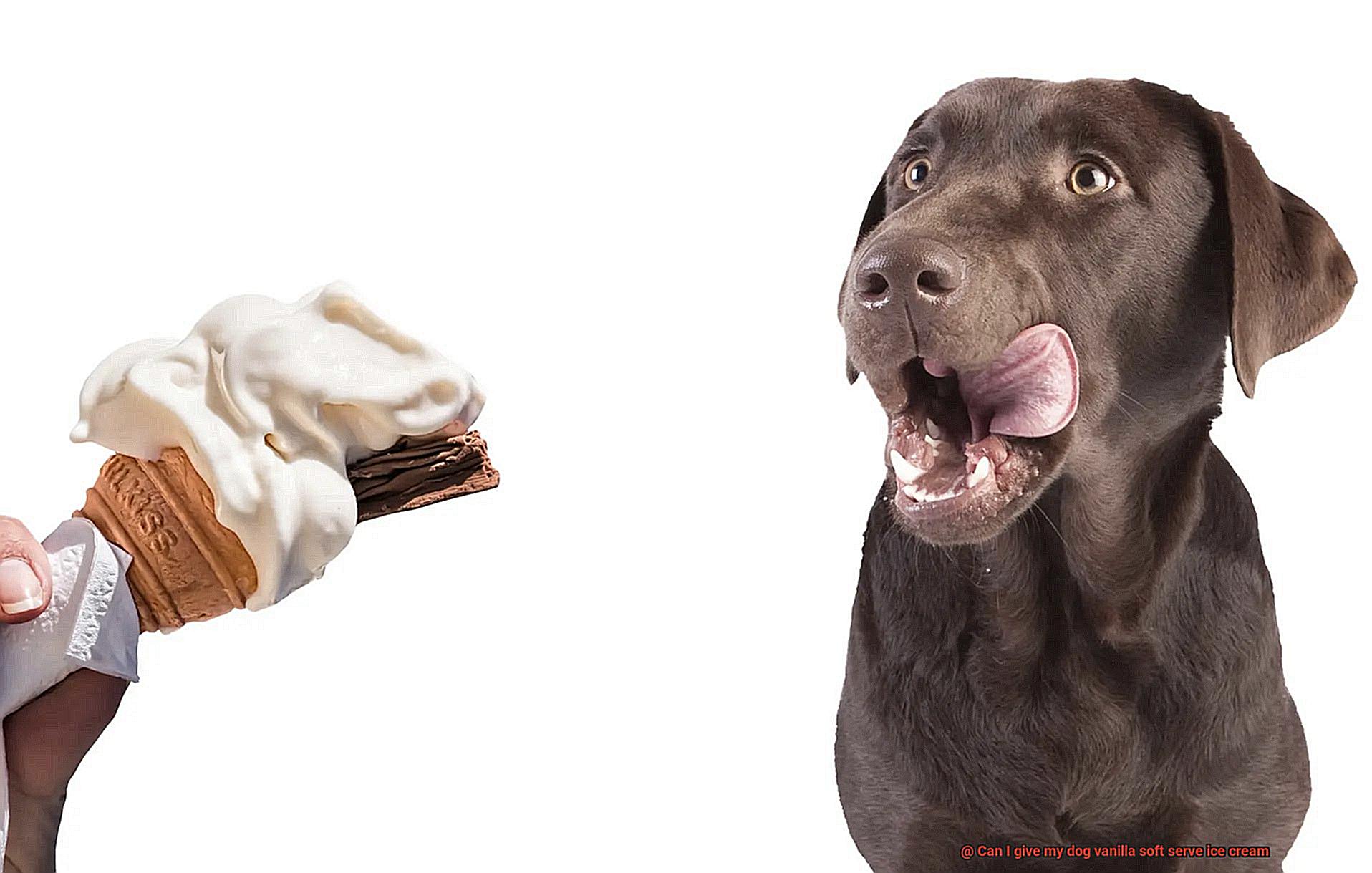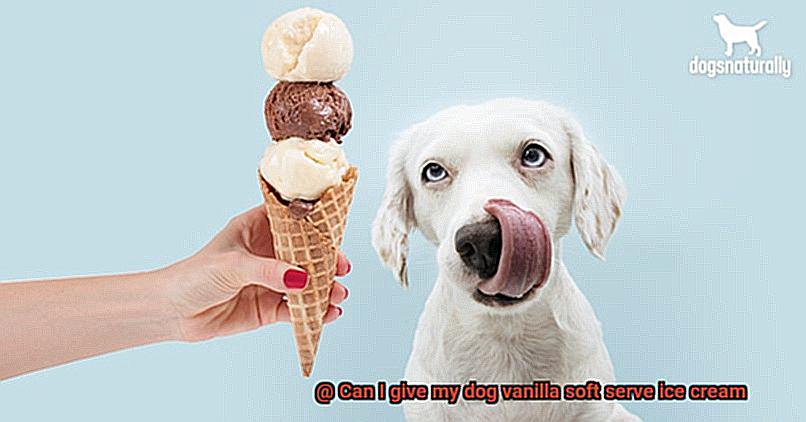Can I give my dog vanilla soft serve ice cream?
We all know how much our furry pals mean to us, and sometimes, we just can’t resist spoiling them with a little treat. And when the sun is blazing hot, what better way to cool down than with a creamy vanilla soft serve ice cream? But here’s the million-dollar question: Can our four-legged buddies safely chow down on this frosty goodness? Today, we’re gonna dig deep into the vanilla soft serve debate and find out if it’s a go or a no-go for our canine companions.
Now, before you start drooling over the thought of sharing your ice cream cone with your pup, let’s take a moment to consider the potential risks and rewards. On one paw, dogs go absolutely bonkers for that sweet taste, and honestly, who doesn’t love seeing their happy tail wagging like crazy? But on the other paw (yes, dogs have two), certain ingredients lurking in ice cream can spell trouble for our furry friends.
So grab your scoop (or just imagine it) as we embark on this journey together. We’ll uncover the potential dangers and benefits of treating your pooch to some vanilla soft serve ice cream. Armed with this knowledge, you’ll be able to make an informed decision about whether Fido gets to join in on the summer treat fun. Ready? Let’s dive right in.
Is Vanilla Soft Serve Ice Cream Safe for Dogs?
Contents
- 1 Is Vanilla Soft Serve Ice Cream Safe for Dogs?
- 2 The Potential Risks of Feeding Vanilla Soft Serve Ice Cream to Dogs
- 3 How Much Vanilla Soft Serve Ice Cream Can I Give My Dog?
- 4 Alternatives to Vanilla Soft Serve Ice Cream for Dogs
- 5 What to Consider When Feeding Your Dog Vanilla Soft Serve Ice Cream
- 6 Tips for Introducing New Foods into Your Dog’s Diet
- 7 Signs and Symptoms of Gastrointestinal Issues in Dogs
- 8 How to Tell if Your Dog is Lactose Intolerant
- 9 Conclusion
As a French Bulldog owner, you probably want to spoil your furry friend with tasty treats. One popular summertime indulgence is vanilla soft serve ice cream. But before you share a cone with your Frenchie, it’s important to know if it’s safe for them to consume. In this blog post, we’ll explore whether vanilla soft serve ice cream is a dog-friendly treat or if there are better alternatives available.
Understanding the Risks:
- Lactose Intolerance: Dogs lack the enzyme lactase, which helps them digest lactose, the sugar found in milk. This means that many dogs are lactose intolerant and can experience digestive issues like diarrhea and stomach upset after consuming dairy products.
- Artificial Sweeteners: Some brands of vanilla soft serve ice cream use artificial sweeteners like xylitol, which is toxic to dogs. Xylitol can cause a rapid release of insulin in dogs, leading to low blood sugar levels (hypoglycemia) and potentially life-threatening consequences.
- High Sugar and Fat Content: Vanilla soft serve ice cream is often loaded with sugar and fat, which can contribute to weight gain and other health problems in dogs if consumed regularly or in large quantities. Obesity is a prevalent issue among French Bulldogs and can lead to diabetes, joint issues, and heart disease.
Safer Alternatives:
- Dog-Friendly Ice Cream: There are frozen treats specifically made for dogs, using safe ingredients and formulated with their dietary needs in mind. These treats are a healthier alternative to regular vanilla soft serve ice cream and can be found in pet stores or made at home using dog-friendly recipes.
- Homemade Frozen Treats: You can make your own frozen treats for your French Bulldog using ingredients that are safe for them. Plain yogurt, pureed fruits like bananas or strawberries (in moderation), and even some dog-safe vegetables like carrots or sweet potatoes make for delicious and refreshing treats.
Consult Your Veterinarian:
It’s always a good idea to consult with your veterinarian before introducing any new food or treat into your French Bulldog’s diet, including vanilla soft serve ice cream. They can provide personalized advice based on your dog’s specific needs and health conditions.
The Potential Risks of Feeding Vanilla Soft Serve Ice Cream to Dogs
As much as we love to spoil our French Bulldogs with treats, it’s important to be aware of the potential risks associated with feeding them certain foods. One treat that may seem innocent but can actually pose several health risks is vanilla soft serve ice cream. Let’s take a closer look at why this sweet indulgence may not be the best choice for your furry friend.
- High Sugar Content: Most commercial vanilla soft serve ice creams are loaded with sugar. While a small lick or two may not cause immediate harm, excessive sugar intake can lead to obesity in dogs. Obesity is a serious health concern and can increase the risk of diabetes, joint problems, and heart disease.
- Artificial Sweeteners: Beware of artificial sweeteners like xylitol commonly found in vanilla soft serve ice cream. Xylitol is highly toxic to dogs and can cause a rapid drop in blood sugar levels, leading to hypoglycemia or even liver failure. It’s crucial to check the ingredient list and avoid any ice cream containing this harmful sweetener.
- Digestive Upset: Dogs have low levels of lactase, the enzyme needed to digest lactose found in dairy products like vanilla soft serve ice cream. Feeding your French Bulldog this treat can result in gastrointestinal upset, including diarrhea, vomiting, and gas.
- Allergies and Sensitivities: Some dogs may have food allergies or sensitivities to ingredients commonly found in vanilla soft serve ice cream, such as milk or certain flavorings. These allergies can manifest as skin irritations, itching, or digestive issues.
- Nutritional Imbalance: Dogs require a balanced diet that meets their specific nutritional needs. Feeding them excessive amounts of vanilla soft serve ice cream can disrupt this balance and lead to an imbalance in their overall nutrition.
Safer Alternatives:

Instead of risking your French Bulldog’s health with vanilla soft serve ice cream, consider these safer alternatives:
- Dog-Friendly Ice Cream: Look for frozen treats specifically made for dogs. These are usually free of harmful ingredients and are designed to provide a safe and delicious indulgence.
- Homemade Frozen Treats: Make your own frozen treats using dog-friendly ingredients like plain yogurt and fruits. Freeze them into small portions and offer them as a refreshing and healthier alternative.
How Much Vanilla Soft Serve Ice Cream Can I Give My Dog?
French Bulldogs are adorable and beloved pets known for their playful personalities and affectionate nature. As responsible pet owners, we want to share our favorite treats with them, like vanilla soft serve ice cream.
However, it’s important to understand the potential risks and limitations before indulging our furry friends. In this article, we’ll explore how much vanilla soft serve ice cream is safe for French Bulldogs and discuss some crucial considerations.
Understanding the Risks:
- Lactose Intolerance: French Bulldogs, like many other dogs, may have difficulty digesting lactose, the sugar found in milk. Feeding them excessive amounts of vanilla soft serve ice cream can lead to digestive upset, including diarrhea, gas, and bloating.
- High Sugar Content: Vanilla soft serve ice cream contains high levels of sugar. Just like in humans, excessive sugar consumption can contribute to weight gain, obesity, dental issues, and even diabetes in dogs.
Recommended Serving Size:
When it comes to sharing vanilla soft serve ice cream with your French Bulldog, moderation is key. Here are some guidelines to follow:
- Size Matters: Consider your French Bulldog’s size when determining portion sizes. Smaller French Bulldogs may only need a teaspoon or two as an occasional treat, while larger ones can have a few tablespoons.
- Age and Health Conditions: Puppies and senior dogs may have more sensitive stomachs and may not tolerate vanilla soft serve ice cream well. Consult with your veterinarian if you have concerns about your French Bulldog’s health or dietary restrictions.
- Occasional Treats Only: Vanilla soft serve ice cream should be an occasional indulgence rather than a regular part of your French Bulldog’s diet.
Safety Precautions:
To ensure your French Bulldog’s safety and enjoyment, follow these precautions:
- Plain Vanilla Only: Avoid giving your French Bulldog vanilla soft serve ice cream with mix-ins or toppings that could be harmful to dogs, such as chocolate, nuts, or artificial sweeteners.
- No Cones: Cones can pose a choking hazard and may cause digestive issues if swallowed whole. Stick to serving the ice cream in a dog-safe dish instead.
- Watch for Reactions: Always monitor your French Bulldog for any signs of discomfort or adverse reactions after consuming vanilla soft serve ice cream. If you notice any digestive upset or concerning symptoms, consult your veterinarian.

Alternatives to Vanilla Soft Serve Ice Cream for Dogs
While vanilla soft serve ice cream may seem tempting, it’s important to consider the potential risks associated with dairy and excess sugar for our furry friends. Luckily, there are plenty of alternative options that are not only safe but also delicious and nutritious.
Frozen Yogurt:
Frozen yogurt is a popular alternative to traditional ice cream for dogs. It contains less sugar and artificial additives, making it a healthier choice. Make sure to choose plain or unsweetened frozen yogurt without any xylitol, as this sweetener can be toxic to dogs. You can even add some dog-safe toppings like diced fruits or a sprinkle of cinnamon for extra flavor.
Fruit-based Treats:
Fruits such as bananas, strawberries, blueberries, and watermelon can be frozen and served as a refreshing substitute for vanilla soft serve ice cream. These fruits are not only tasty but also packed with essential vitamins and minerals that contribute to your French Bulldog’s overall well-being.
Peanut Butter Treats:
Who can resist the delightful taste of peanut butter? Dogs absolutely love it. You can freeze peanut butter in molds or spread it on a treat dispenser toy for your French Bulldog to enjoy. Just remember to choose natural peanut butter without xylitol, as this ingredient can be harmful to dogs.
Frozen Bone Broth:
Bone broth is not only enticing but also offers numerous health benefits for your furry friend. Freezing bone broth into ice cube trays or molds creates a delicious and soothing treat that supports joint health and aids digestion. Plus, it’s easy to make at home using chicken or beef bones.
Homemade Frozen Treats:
Get creative in the kitchen and make your own frozen treats for your French Bulldog. Plain yogurt, mashed sweet potatoes, and pumpkin puree are excellent base ingredients that can be mixed together and frozen in molds or ice cube trays. This way, you can control the ingredients and ensure a healthy and dog-friendly treat.
Commercial Dog Ice Creams:
If you prefer the convenience of store-bought options, there are various commercial dog ice creams available. These specially formulated treats are made with safe and healthy ingredients, ensuring that your French Bulldog can indulge in a frozen delight without any harm.
What to Consider When Feeding Your Dog Vanilla Soft Serve Ice Cream
Summer is here, and the scorching heat calls for a cool and refreshing treat. As a French Bulldog owner, you want to make sure your furry friend stays cool and enjoys the summer just as much as you do. While it may be tempting to share your vanilla soft serve ice cream with your pup, there are a few things you should consider before indulging them in this sweet delight.
The Sugar Dilemma:
French Bulldogs, like many other dog breeds, have different dietary needs than humans. One of the main concerns when it comes to feeding vanilla soft serve ice cream to your Frenchie is its high sugar content. Dogs’ bodies are not designed to process large amounts of sugar, which can lead to weight gain, obesity, and even diabetes. To keep your Frenchie healthy and fit, it’s important to limit the amount of vanilla soft serve ice cream or opt for treats with lower sugar content.
Lactose Intolerance:
Did you know that many dogs, including French Bulldogs, are lactose intolerant? Lactose is a sugar found in milk and dairy products that dogs have difficulty digesting. Feeding your Frenchie vanilla soft serve ice cream can result in gastrointestinal issues like diarrhea, vomiting, and stomach discomfort. To avoid these unpleasant symptoms, it’s best to steer clear of any dairy-based treats if your Frenchie is lactose intolerant.
Hidden Dangers:
Not all vanilla soft serve ice creams are created equal. Some may contain artificial sweeteners like xylitol, which can be extremely toxic to dogs. Always check the ingredients list before sharing any ice cream with your Frenchie and avoid those that contain xylitol or other harmful artificial sweeteners. Additionally, be cautious of additives and flavorings used in vanilla soft serve ice cream. Common ingredients like chocolate chips, nuts, or raisins can be toxic to dogs and should never be included in their diet.
Portion Control:
Just like humans, dogs should enjoy treats in moderation. While a small lick of vanilla soft serve ice cream may not harm your Frenchie, overindulging can lead to various health problems. It is recommended to consult with your veterinarian to determine the appropriate serving size for your Frenchie based on their size, age, and overall health.
Tips for Introducing New Foods into Your Dog’s Diet
Introducing new foods into your French Bulldog’s diet can be an exciting adventure, but it’s important to do it gradually and with caution. Just like humans, dogs have different dietary needs, and sudden changes can upset their digestive system. In this guide, we will provide you with some helpful tips to ensure a smooth transition for your furry friend.
Start Slowly:
When introducing a new food to your French Bulldog, it’s best to start with small amounts. Mix a small portion of the new food with their regular food and observe how they react. This gradual approach allows their digestive system to adjust and minimizes the risk of any adverse reactions.
Monitor for Allergies or Sensitivities:
Every dog is unique, so it’s essential to keep an eye out for any signs of allergies or sensitivities when introducing new foods. Common symptoms include vomiting, diarrhea, or excessive itching. If you notice any of these reactions, consult with your veterinarian immediately.
Consider Nutritional Value:
Before adding a new food to your French Bulldog’s diet, consider its nutritional value and how it fits into their overall diet. A balanced diet is crucial for their health and well-being. Consult with your veterinarian to ensure that the new food meets their specific dietary requirements.
Consult with Your Veterinarian:
It’s always a good idea to consult with your veterinarian before introducing any new foods, especially if your French Bulldog has any specific dietary needs or health conditions. They can provide valuable guidance and recommend suitable options based on your dog’s individual needs.
Stick to Dog-Specific Treats and Foods:
While it may be tempting to share some of our favorite human foods with our furry friends, it’s important to remember that not all human foods are safe for dogs. Stick to dog-specific treats and foods that are formulated to meet their nutritional needs. Avoid giving them foods that may contain harmful ingredients or high sugar content.
Practice Moderation:
When introducing new foods into your French Bulldog’s diet, always practice moderation. Even though a food may be safe for dogs, excessive amounts can still lead to health issues. Treats and new foods should be given in moderation to maintain a healthy balance in their diet.
Signs and Symptoms of Gastrointestinal Issues in Dogs
French Bulldogs are adorable and lovable companions, but like any other dog breed, they can experience gastrointestinal issues. As a responsible pet owner, it is important to be aware of the signs and symptoms of these problems to ensure your furry friend stays happy and healthy. Here are some common signs to watch out for:
- Vomiting: French Bulldogs may occasionally vomit due to minor stomach upset, but frequent or persistent vomiting is a red flag. It could indicate more serious issues like gastritis, pancreatitis, or an intestinal obstruction.
- Diarrhea: Loose or watery stools can be caused by dietary changes, infections, parasites, or inflammatory bowel disease. Keep an eye on your Frenchie’s stool consistency and seek veterinary care if diarrhea persists or worsens.
- Abdominal pain: Restlessness, pacing, panting, hunched posture, and sensitivity to touch are signs that your French Bulldog may be experiencing abdominal discomfort. Consult with your veterinarian to determine the cause and appropriate pain management.
- Changes in appetite and weight loss: If your Frenchie loses interest in food, refuses to eat, or experiences unexplained weight loss despite a normal food intake, it could be a sign of gastrointestinal issues. Promptly address any significant changes in appetite or weight.
- Difficulty defecating: Straining during defecation, difficulty passing stools, or producing small, hard stools can indicate constipation. Monitor your Frenchie’s bowel movements and seek veterinary care if constipation persists.
- Excessive gas and bloating: If your French Bulldog frequently passes gas or shows signs of bloating, it may be a result of dietary factors, food allergies, or gastrointestinal diseases. Discuss this with your veterinarian for proper management options.
How to Tell if Your Dog is Lactose Intolerant
As proud owners of these adorable, squishy-faced fur babies, we want to make sure we’re taking care of them in the best possible way. One important aspect of their well-being is their diet. Today, we’ll explore how to tell if your French Bulldog is lactose intolerant and what steps you can take to keep them happy and healthy.
What is Lactose Intolerance?
Lactose intolerance is when dogs have trouble digesting lactose, the sugar found in milk and dairy products. It’s essential to understand that not all dogs are lactose intolerant, but some, like our French Bulldogs, are more prone to this condition due to their genetic makeup. If you suspect your furry friend may have lactose intolerance, it’s crucial to consult with your veterinarian for proper guidance.
Recognizing the Symptoms
Keep an eye out for common signs of lactose intolerance, such as diarrhea, gas, bloating, vomiting, and tummy discomfort. Remember that these symptoms can also be caused by other conditions like food allergies or gastrointestinal issues. Your vet can help determine if lactose intolerance is the culprit through tests like lactose tolerance tests or an elimination diet.
Testing for Lactose Intolerance
A lactose tolerance test involves giving your French Bulldog a small amount of lactose and observing their reaction. If they experience digestive upset or discomfort after consuming lactose, it may indicate lactose intolerance. An elimination diet entails removing all dairy products from your pup’s diet for a period of time and monitoring if their symptoms improve.
Living with Lactose Intolerance
If your French Bulldog is diagnosed with lactose intolerance, don’t worry. There are plenty of delicious and safe alternatives to satisfy their taste buds. Look for lactose-free treats or frozen snacks specifically formulated for dogs. These tasty options will keep your pup’s tummy happy without any digestive issues.
Consulting with Your Veterinarian
Remember, every French Bulldog is unique, and what works for one may not work for another. Always consult with your veterinarian for personalized advice and guidance. They can provide recommendations based on your dog’s specific needs, ensuring they receive the best care possible.
C3QidM0q2Cc” >
Conclusion
In conclusion, it is generally safe to give your dog a small amount of vanilla soft serve ice cream as an occasional treat.
However, there are a few important factors to consider. First and foremost, you should always consult with your veterinarian before introducing any new food into your dog’s diet.
Additionally, it’s crucial to remember that not all dogs tolerate dairy products well, as many can be lactose intolerant. If your dog shows any signs of digestive discomfort or allergies after consuming ice cream, it is best to avoid giving it to them in the future.
Furthermore, moderation is key when it comes to treats like ice cream, as excessive consumption can lead to weight gain and other health issues in dogs. Finally, be mindful of the ingredients in the ice cream you choose for your furry friend.
Avoid flavors that contain harmful additives such as chocolate or xylitol, as these can be toxic to dogs.




